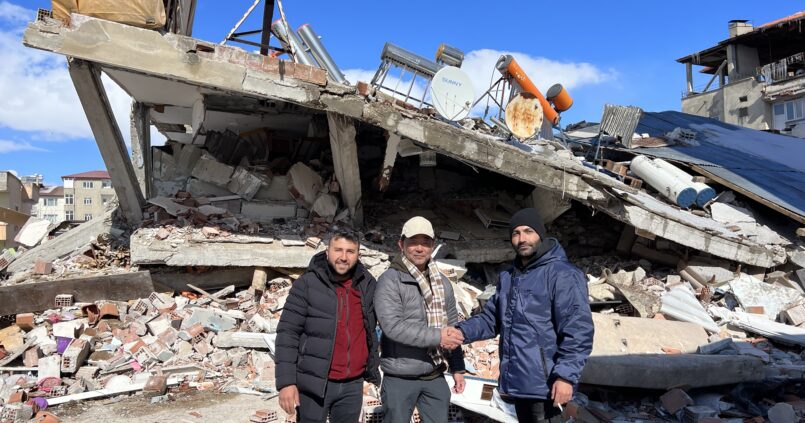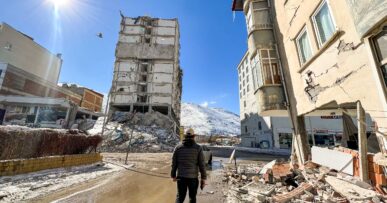February 15th
Ancient city of Antioch (Hatay)
Today, I am walking carefully through the downtown area of Hatay on a small trail of twisted metal, broken concrete, and bricks. It is a somber sight to see that around 90% of buildings have been wrecked. I can only imagine what this place used to be like, with its narrow downtown streets bustling with commerce, restaurants, and apartments. All that is gone now; it disappeared in an early morning tremor a few days ago.
Surprisingly, this town is far from the ruptured fault line, approximately a few hundred kilometers away. However, it sits on a soft riverbed that cuts through the town, and the soft soil amplifies the motion of the earthquake. Coupled with the unretrofitted old stock of buildings, it has become an area where thousands of people have lost their lives.
As I look along the river, I can see kilometers of destroyed and tilted mid-rise buildings, which reminds me of a picture of Hiroshima after the nuclear blast. Earlier, I came across a little soup kitchen by the street manned by a Syrian family. A little boy walked up to me from the kitchen with a bowl of soup, wanting to feed me. My Turkish colleague said, “The family must have been refugees themselves a few years ago. Now they want to help us. This is what’s so incredible about humanity.”
February 16,
A mountain town that has been destroyed
I am in the snowy mountain town of Elbistan, not far from the back-to-back M7.8 and M7.5 epicenters. A young man leads me to his broken apartment, and after unlocking the rusty door, we climb up to his family room. The staircase walls have a fair number of cracks, and climbing up to the fifth level at an elevation of 5000 feet is difficult. It’s cold here. NASA’s satellite damage assessment map shows that 57% of the building stock has some damage, ranging from collapse to light damage. It seems to be about right seeing it from the ground. With high snow-covered rugged mountains surrounding it, I may guess the town has a population of 20,000 to 50,000 people. As I walk through his apartment, I examine it floor by floor, room by room, and crack by crack. I don’t see any structural distress or even minor cracks in the main structural elements, such as columns and beams. All the cracks are located in non-structural infill walls made of hollow bricks. I conclude that the structure was not compromised by these gigantic earthquakes. I inform him of this, and I can see the relief on his face. He says, “I thought so but needed an engineer’s validation. I will hire an engineer and a contractor to fix my home.”
He promptly grabs a medal and his scarf and gives them to me. He says, “These are extraordinarily important things to me. The medal is from my special force days in the Turkish army, and the scarf is what I have been wearing since I was six years old.” I say, “I can’t accept such gifts. You lost everything, and your gratitude is more than
enough.” But he insists. My Turkish interpreter colleague says, “You should accept these gifts. This is a special day for him.” In the end, I accept the gifts. I have come across moments like this all over Turkey. They share amongst each other even though they’ve lost everything.
February 17th
Today, I went on a drive with chef Jose Andres through a green plateau surrounded by snowy, rocky mountains. Jose is well known for his famous restaurants and Netflix shows, but his charity, World Central Kitchen, caught my attention. This incredible organization responds to about 100 disasters yearly and often reaches disaster sites faster than the search and rescue team. They currently provide 200,000 meals a day in a dozen locations in the disaster area.
Jose asked me to accompany him to inspect some of the buildings he uses as kitchens. The cooks and staff have been worried about some cracks in the structures. This was not the first time we do this kind of arrangement. We cooperated in similar inspections in past earthquake disasters.
I must say that Jose is an interesting character. His strong personality is reflected in every detail of his operation. Despite the local government’s request for him to slow down for reasons I am not privy to, he pushes through, and nothing stops him or his people from feeding those in despair.
As we drove, Jose behind the wheel, both of us singing and laughing while passing through broken yet beautiful scenes. In his strong Spanish accent, he declared, “My 30 restaurants are my business, but feeding people in disasters is my passion.” I could see that his passion was evident in everything he did. Tragedy often brings out the best in humanity, and it is inspiring to see people like Jose and his team at World Central Kitchen rise to the occasion and help those in need.


